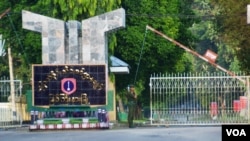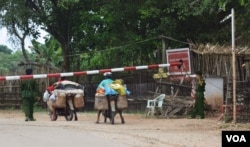The siblings Kaw Nan and La Moi appear glum and still shocked when asked to explain what happened to their father after he removed some fences that a company had built on his farmland in Phang Meti Village.
In early August, they said, police suddenly summoned Nhkum Naw Bawk, 58, and two other farmers who had experienced similar problems, because the company had filed a criminal complaint against them for trespassing and destroying private property.
“The police told us: ‘Don’t worry, just bring your father to pick up the legal documents,’ but then he was arrested at the court together with the other farmers,” La Moi, 25, said during an interview at the village located near the Kachin State capital Myitkyina in northern Myanmar.
“It’s a real tragedy for us — our father is the pillar of our household,” his sister Kaw Nan, 28, said, adding that he provided the income for the 12-member family by farming their 10 acres of paddy and old teak and fruit trees.
“He has a lung problem, and we worry about him a lot. The custody conditions are very harsh, our father said he only has a one-meter-wide space to sleep,” she said, looking concerned.
Brang Aung of the Kachin Lawyers Network told VOA by phone this week that the farmers were released on bail recently after about two months in jail. But he said the case is ongoing and the trio could still receive prison terms from three months to two years.
‘All our land has been grabbed’
The Kachin farmers became embroiled in a land dispute with a Burmese businesswoman named Khin Thant Zin after she purchased the title to 170 acres from another businessman last year, about 100 acres of which overlapped with their farms.
“All our land has been grabbed by that bad lady. She doesn't know exactly where the land is that she bought, but we know for sure that our family has cultivated our land for many years,” said Kaw Nan. “But since we all know she has links with the police and the military, our father was charged and put in jail.”
VOA was unable to reach Khin Thant Zin for comment.
New disputes on old land grabs
Kachin State Farmers Network activist Lahpai Zau Taung said the farmers’ loss of land and disputes over ownership go back to the 1990s, when the army confiscated 500 acres in Phang Meti and other villages for a base that was never built.
Local commanders then sold the land to private businessmen and hundreds of villagers lost their farms to make way for rubber plantations. In other cases, the army issued licenses seizing control over farmers’ lands without informing or evicting them. The licenses can be left dormant for many years until a businessman purchases them and begins clearing the land, sparking new disputes.
“When outsiders come with their license and fence off the land, local people are very surprised and they break down the fences — a lot of disputes happen like this,” Lahpai Zau Taung said. “But all these lands were traditionally used by local people, so it’s clear that (businesswoman) Khin Thant Zin is wrong to claim this land.”
Such old land grabs and new disputes have affected thousands of farmers across Kachin State, said Lahpai Zau Taung, adding that farmers who resisted through unauthorized protests or by hindering companies were taken to court, which is often seen as corrupt and lacking independence.
A nationwide junta legacy
Land rights lawyers said the case in Kachin State is representative of the massive land grabbing that occurred during decades of army rule in Myanmar.
These junta-era confiscations affected the livelihoods of millions of people and most were done “without regard for the appropriate laws,” said Caitlin Pierce of the international NGO Namati. She added that these farmers have legal rights to regain their land or be offered other lands and receive compensation.
Following democratic reforms in recent years, farmers have become more assertive, and many have tried to reclaim their land or resist new land investment. Hundreds have faced retribution from companies or authorities and have been imprisoned.
Land rights, along with peace and democratization, is now one of the most pressing demands of Myanmar’s public and hopes are high that National League for Democracy (NLD) government, which assumed office in April, will address the issue.
Zaw Htay, a spokesperson of de facto government leader and State Councilor Aung San Suu Kyi, acknowledged as much, saying, “It is a top priority of the NLD government. The land issue is a very complicated issue because many stakeholders are involved. But … we are planning to deal with all of the land issues, including land management.”
NLD initiative
In May, the government created a national land committee that is working with state and regional governments, and through existing laws, to resolve the huge backlog of outstanding claims for return of land. Land redistribution appears to have been ruled out by the government.
The previous, army-backed parliament took some initial steps to address the issue and created a land commission that received some 30,000 claims. But by December 2015, only 4 percent were found justified to receive compensation, said Namati, which trained dozens of community paralegals that help solve land claims. The NLD-dominated parliament has said it will resume work on the remaining cases.
According to Namati, farmers can reclaim lands through existing laws, though the procedures are complicated with a lack of transparency and put a high burden of proof on the farmer, while the departments that implement the procedures are in the army-controlled Ministry of Home Affairs.
The government’s new land committee is creating local-level committees to improve these procedures and speed up the return of land. But Pierce said the initiative had been off to a slow start and lacked sufficient funding for the huge task ahead, while more efforts should also be made to select the right civil society and community representatives to participate in the local committees.
While such land reforms under the NLD could bring relief to affected farmers in years to come, it will offer little help to those, like Nhkum Naw Bawk, who resisted land grabs and became entangled in court cases.
“We don't know what legal actions they will take against our father,” said La Moi, Nhkum Naw Bawk’s son. “We have great concern about the court system, it used to be known for corruption, and the crony we face is very rich. We hope there will be justice.”






